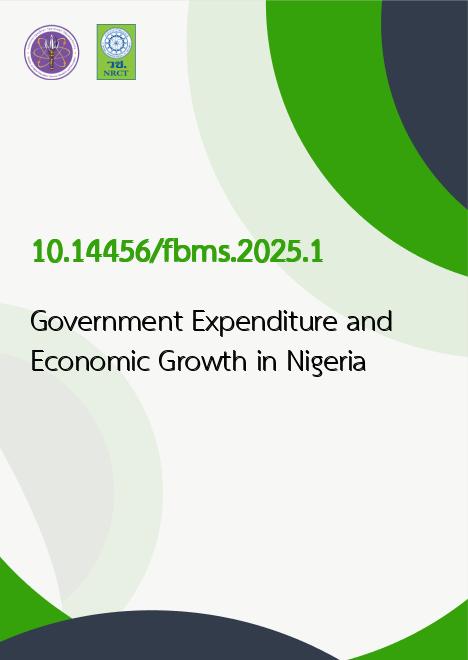
|
Government Expenditure and Economic Growth in Nigeria |
|---|---|
| รหัสดีโอไอ | |
| Creator | NWIKPUGI, JOSEPHINE BARINE |
| Title | Government Expenditure and Economic Growth in Nigeria |
| Contributor | AGBANA, ZUOBOMUDOR EDWIN |
| Publisher | University of the Thai Chamber of Commerce |
| Publication Year | 2568 |
| Journal Title | Journal of Family Business and Management Studies |
| Journal Vol. | 17 |
| Journal No. | 1 |
| Page no. | p3-22 |
| Keyword | Government Expenditure, Economic Growth in Nigeria, Johansen Co-integration, Vector Auto-regression Mechanism, the Real Gross Domestic Product |
| URL Website | www.fbmsjournal.com |
| Website title | fbmsjournal |
| ISSN | 2821-9643(online) |
| Abstract | Before the 19th century, public expenditure was considered tobe a significant government involvement in the economy. In global academic and political debate, the impact of fiscal imbalances on economic growth has been intense. Infrastructural deficits in Nigeria have been shown in recent research, which may have hindered economic growth. As a result, the objective of this research was to determine the long- and short-term effects of Nigerian government spending on economic growth. Central Bank of Nigeria Statistics Bulletin data were used in this study (2020). The research included both descriptive and analytical techniques common to economics. Additional statistical methods were used in the estimation of the model of economic growth, such as the Johansen-Co-integration Test (JCT) and Vector Auto-regression Mechanism (VECM). In the short term, the study found that government spending on education and agriculture had a positive impact on the Real Gross Domestic Product (RGDP), while spending on health, transportation, and debt servicing had a negative impact. Government expenditure on education (GEE), infrastructure (GERC), and debt service (GEPDS) have all been shown to be long-term investments (GEPDS). In light of this, we argue that government spending in Nigeria is a growth-promoting factor. This suggests that there should be an increase in government sectoral allocations for education and agriculture, as well as government regulation and monitoring of implementation processes to ensure that released funds are used for their intended purpose. Government should also carry out a constant review of health sector reforms to reduce the burden of inefficient health care delivery. |
